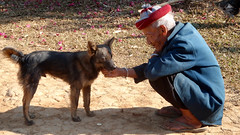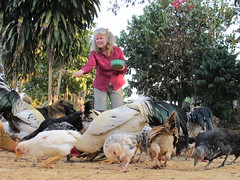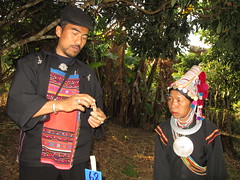How do travellers locate an authentic, old-style Akha village in which to enjoy a home stay?
 Enter an NGO called AFECT Asia, which kept on surfacing as a highly recommended outfit after we started our research on the Internet. Founded by the late Dutch anthropologist Dr. Leo von Gesaw, this organization is dedicated to helping the Akha maintain their traditional way of life, culture, language, and animist religion.
Enter an NGO called AFECT Asia, which kept on surfacing as a highly recommended outfit after we started our research on the Internet. Founded by the late Dutch anthropologist Dr. Leo von Gesaw, this organization is dedicated to helping the Akha maintain their traditional way of life, culture, language, and animist religion.
After browsing AFECT’s website, we booked a 7-day trip with them, which would involve a 4-day/3-night stay at Sai Jai Pattana village followed by a four-night stay at their Chiang Rai dorm, where we would travel with AFECT staff and visit other villages.
Our guide, interpreter and host for most of our stay was Athu Pochear, director of AFECT’s many Akha projects. After spending a week together, he would become a friend with whom we’ll stay in touch. He’ll help match our skills to volunteer projects when we return.
After booking our seven-day stay on the Internet, the stage was set: What would our home stay actually be like?
Our four days with Apae and Megah Pochear at Sae Jai Pattana village proved to be a moving, special opportunity to participate in and learn about the Akha hill tribe’s way of life prior to volunteering. We were warmly welcomed by our hosts who shyly stated they thought we may not be comfortable at their home. Surprised, we asked why.
After an exchange in Akha, Athu explained Apae and Megah’s concerns: “It’s the roosters. They’re so noisy! They crow at 1:00, 3:00, and 5:00. And then there are the dogs.” Gazing at the roosters, hens, chicks, and dogs in the yard, we thought to ourselves that yes, it would be noisy.
“Please, don’t worry,” I said. “We are here in your home and village, eager to stay and experience your ways. If it’s still okay, may we stay?”
Megah beamed; Apae nodded. Megah showed us our room: a king-size cot with typical hard Thai mattress. The toilet was a shared squat affair, outside in a corrugated iron hut with a cold water faucet serving as shower.
Perfect: with basic needs met and gracious hosts, we’d be a-okay.
 And so our first evening began. Beckoned upstairs onto the shaded, breezy verandah of their bamboo home, we shared a whiskey with Apae and Athu’s 87-year-old father, Aq Bawl – “grandfather.” Megah placed steaming bowls of delicious, carefully spiced foods onto a low, circular bamboo table. She and Apae had prepared dinner over the two open hearths in their dirt-floored kitchen. Akha men usually cook the meat, and certainly cooking dinner together seemed a pleasure for this obviously loving husband and wife.
And so our first evening began. Beckoned upstairs onto the shaded, breezy verandah of their bamboo home, we shared a whiskey with Apae and Athu’s 87-year-old father, Aq Bawl – “grandfather.” Megah placed steaming bowls of delicious, carefully spiced foods onto a low, circular bamboo table. She and Apae had prepared dinner over the two open hearths in their dirt-floored kitchen. Akha men usually cook the meat, and certainly cooking dinner together seemed a pleasure for this obviously loving husband and wife.
Accompanying us for the four days were Leeja and Edd, young Akha men who would be our guides, translators and companions. Between mouthfuls of rice, green beans, buffalo meat, and other unidentifiable but delicious foods, they explained the morning drill. After breakfast at some undetermined time we would head on a jungle trek, which sounded both interesting and exciting. “The boys” were eager to show off their AFECT projects, their village, and their capabilities.
Immediately after dinner, at 8:30 p.m., everyone went to bed: this would be the pattern of our stay: early to bed and early to rise .
 The roosters crowed boisterously right on schedule. Dogs joined in, greeting the dawn. Repeatedly. Sleep was banished. After feeding the chickens (a chore I eagerly adopted) Megah served breakfast and I helped with dishes. Then it was time to herd the cows (well, more accurately, follow their lead) down the village lane to their pasture: this became our morning rhythm.
The roosters crowed boisterously right on schedule. Dogs joined in, greeting the dawn. Repeatedly. Sleep was banished. After feeding the chickens (a chore I eagerly adopted) Megah served breakfast and I helped with dishes. Then it was time to herd the cows (well, more accurately, follow their lead) down the village lane to their pasture: this became our morning rhythm.
 The four days sped past: the jungle trek revealed AFECT’s water irrigation project whose source was a spring bubbling out of the forested hills. A two-kilometre pipeline led to a hillside demonstration garden and that afternoon we would witness Apae joining the last segment of pipe and seeing water spout forth to irrigate the test garden.
The four days sped past: the jungle trek revealed AFECT’s water irrigation project whose source was a spring bubbling out of the forested hills. A two-kilometre pipeline led to a hillside demonstration garden and that afternoon we would witness Apae joining the last segment of pipe and seeing water spout forth to irrigate the test garden.
Leeja proudly showed off his personal project: building a set of 15 rice pounders on the banks of a reservoir, where water would be power the mechanisms. Considering that women traditionally laboriously pound rice by primitive foot-powered technology, Leeja was rightly proud of his efforts. Another day’s hill walk revealed the swidden agriculture whereby field crops are rotated, allowed to go fallow sometimes for several years, and regularly burned. Other explorations took us through emerald-green rice paddies where women and men were doing the backbreaking work of planting rice.
 On our last day we met a shaman, Akaw Ayi, who spoke to us (via Athu’s interpretation) of how she helps the sick and troubled by being a direct link to the spirit world.
On our last day we met a shaman, Akaw Ayi, who spoke to us (via Athu’s interpretation) of how she helps the sick and troubled by being a direct link to the spirit world.
Would we recommend an Akha home stay with AFECT at Sae Jai Pattana village? Definitely… with a couple of cautions: accommodations are rustic – and some Akha foods may prove challenging if you’re squeamish or a strict vegetarian.
Is it worth expanding your comfort zone? Absolutely. After all, Akha and other people who adapt to our world are equally challenged by our customs.
We both would like to return to volunteer in an AFECT project.
